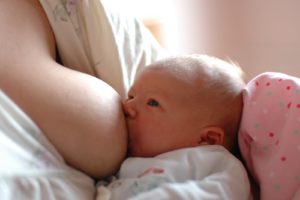
Credit: Wikimedia Commons/ Anton Nosik
Finally some good news for pregnant women who develop a COVID-19 infection during pregnancy (a high-risk situation). According to a recent study, it turns out that in women who had a COVID-19 infection during pregnancy and recovered, their breast milk contains antibodies against the virus. Which get transmitted to the baby during nursing.
This means that the mothers are passing "viral immunity" to their babies, and so the babies are protected from COVID-19. Yay!
Yes, it was a small study of only 15 women, but a second similar study had similar results. As the researchers point out, this discovery has potential benefits to more than the nursing babies. The antibodies in the breastmilk could benefit others.
By the way, so far there is no evidence that a mother can transmit the virus to her baby through breastmilk. The researchers and others have tested breastmilk and have not found any live virus. All these results suggest that donor breastmilk is safe for babies to consume.
Excerpts from The Scientist: Breastmilk Harbors Antibodies to SARS-CoV-2
Milk from lactating moms may hold potent antibodies to counter SARS-CoV-2 infections, according to a new study of 15 women. All of the samples from women who had recovered from COVID-19 and who were breastfeeding babies at the time had antibodies reactive to the virus’s spike protein, researchers report in the November issue of iScience.
Detecting antibodies against the virus in breastmilk indicates that mothers could be passing viral immunity to their babies. Women can “feel pretty comfortable breastfeeding” during the pandemic, Christina Chambers, a perinatal epidemiologist at the University of California, San Diego, who not involved in the new study, tells The Scientist.
To date, there’s no evidence that a mother can transmit SARS-CoV-2 to her baby through breastmilk, Chambers says. She and others have tested breastmilk for SARS-CoV-2 RNA and found a few positive results, but no live virus. Her latest research also suggests that donor milk is safe for babies’ consumption, too, though she hasn’t assessed antibodies in donor milk banks she works with yet.
Antibodies in breastmilk may be useful for more than protecting nursing infants from the virus. Antibodies extracted from milk—as opposed to the current practice of using convalescent serum—could also serve as a therapeutic for COVID-19. However, “people question that this is something that could really happen,” says study coauthor Rebecca Powell, an immunologist at the Icahn School of Medicine at Mount Sinai in New York City. Because there isn’t a wider understanding of the immune benefits of breastmilk, she says, the concept has not caught on in antiviral drug development.
By early April, she and her colleagues had received approval to begin collecting milk samples from lactating mothers who had recovered from COVID-19. The researchers collected samples from eight women who had a SARS-CoV-2–positive PCR test and seven who had suspected cases of the disease but were not tested; all 15 were lactating at the time. The team then compared the samples to ones from different lactating mothers amassed before the pandemic began, first assessing them for the presence of immunoglobulin A (IgA) antibodies using an enzyme-linked immunosorbent assay (ELISA) and then checking the ability of any antibodies found to bind to the SARS-CoV-2 spike protein.
All the of samples from the women who had recovered from COVID-19 had specific SARS-CoV-2 binding activity, while the pre-pandemic samples had low levels of nonspecific or cross-reactive activity, the researchers report. They next tested the antibodies’ response to the receptor binding domain of the SARS-CoV-2 spike protein, and found that 12 out of 15 of the samples from previously-infected donors showed significant IgA binding activity. Some of those samples also included other reactive antibodies such as immunoglobulin G and immunoglobulin M. Compared with the controls, it was IgA and IgG levels that were the highest.
That difference could give breastmilk-derived antibodies an advantage over blood-based ones as far as therapeutic options go, she explains. Antibodies such as IgG that are extracted from serum and transfused into the blood of a sick person travel throughout the body and might not go where they are needed. But secretory antibodies, such as IgA from breastmilk, could be extracted and then inhaled into the respiratory tract—just where those antibodies are needed in COVID-19. Because of the protective secretory component they have, these antibodies can endure in the mucosa and target the virus, Powell explains.
“What we are finding in the milk is unique compared to what many people have already studied in the blood in terms of antibody response,” she says. Research suggests that blood-derived antibodies can last months. Secretory antibodies in breastmilk might last longer, Powell’s most recent data indicate, and that means there could be a longer window to collect antibodies from lactating donors after they’ve recovered from COVID-19.
